Understanding Google My Business & Local Search
Consumer Mindshare and Yelp: An Empire in Local Search Or a Wannabe?
Last week Greg Sterling noted: … Yelp and Google. They’re like Spain and Portugal in the 15th Century — rivals trying to carve up the local globe.
The analogy seemed wrong to me as Spain and Portugal were to a large extent equal in their strength. I noted in the comments that “I see the analogy as more like the US vs the Taliban or perhaps Grenada rather than one of equals like Spain vs. Portugal“.
Is Yelp, as Greg portrays, a powerhouse in local search? Or is their position more one of a far distant second to Google as a general local search site with little hope of competing? Or is the answer more complex than that?
When we view Yelp stricly from a consumer frame of reference (and ignore the lack of profitable business model and their thuggish SMB tactics) is Yelp a strong contender in the general local search category?
On the surface, my recent consumer survey would indicate that Yelp is running a far distant second (or third or fourth) to Google with little chance of competing:
Yet the answer is more nuanced and complex than that. When you parse the data by age, region and urbanicity the picture changes. Much more favorably for Yelp but even with those changes does the data rise to level of proof of Yelp as a general local search engine?
These insights from Google surveys provide clues as to why there is such a divergent view on the reality of Yelp:
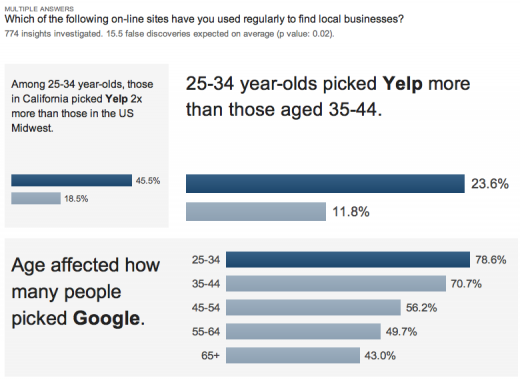 Clearly age is a strong determinant in who uses Yelp. Usage in those over 45 drops way off.
Clearly age is a strong determinant in who uses Yelp. Usage in those over 45 drops way off.
Regional and state differences seem to play a big role as well. The west region and the northeast are more likely to use Yelp than the Midwest or the Southern regions.
This is true as well at a state level. This is particularly visible when you compare the state of CA or NJ (one of the most urban) with either MN or Georgia you see dramatic shifts in usage:
New Jersey:
Minnesota:
This custom report looks at those variables in aggregate and compares younger, urban searchers with rural, suburban older searchers:
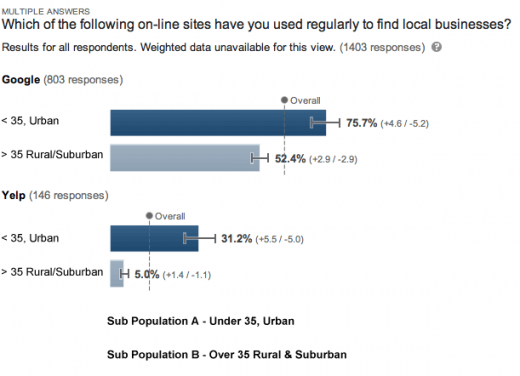 In the end what you see with Yelp is a strong young, urban, bi-coastal bias that makes them a contender in those markets but a true also ran every place else and amongst all other users. Hardly rising to competitor to Google in a broad sense.
In the end what you see with Yelp is a strong young, urban, bi-coastal bias that makes them a contender in those markets but a true also ran every place else and amongst all other users. Hardly rising to competitor to Google in a broad sense.
I think that the answer to the question of whether Yelp is a competitor to Google as a general local search engine lies in their own behaviors as well.
Yelp, as far as I understand it, has pretty much stopped attempting to add every business listing that companies like Localeze and InfoUSA can provide. They are only adding businesses added by their readers or by the business itself. This leaves their offerings very urban centric.
Their business model, which doesn’t scale well currently, can’t scale well at all in a rural or suburban territory. Its way too expensive.
So what Yelp has become is an urban local search engine. One that is popular in certain geographies and limited age groups.
While they might not be the Grenada that I implied initially, they are no Spain yet either.
© Copyright 2024 - MIKE BLUMENTHAL, ALL RIGHT RESERVED.
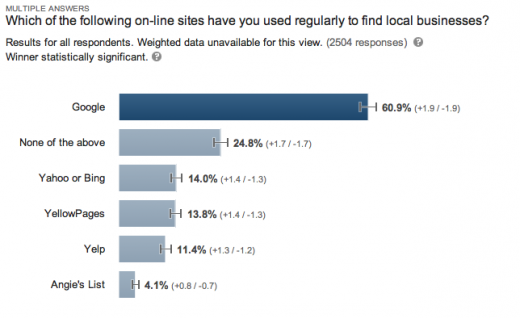
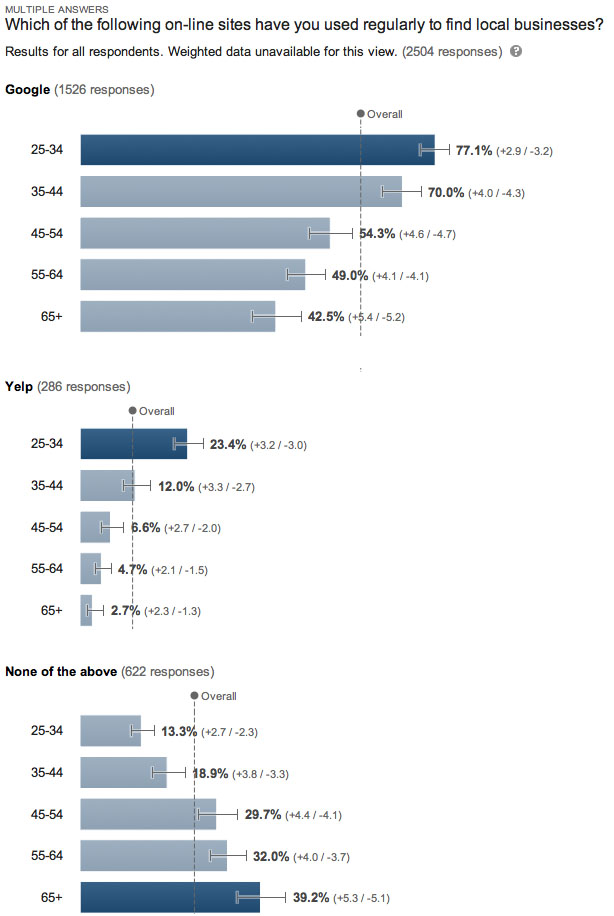
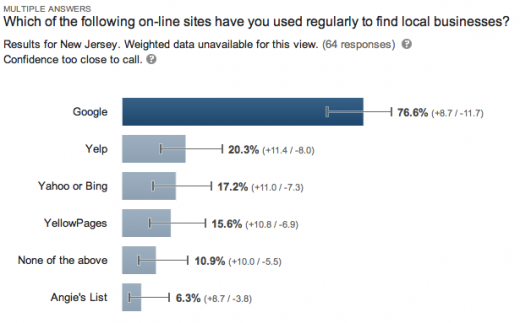
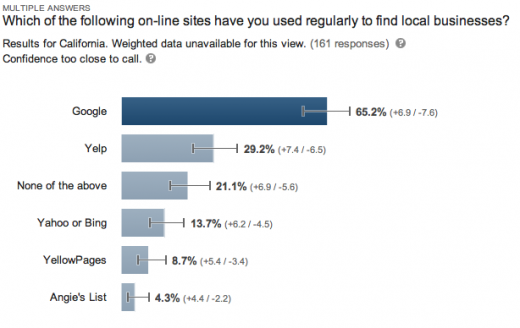
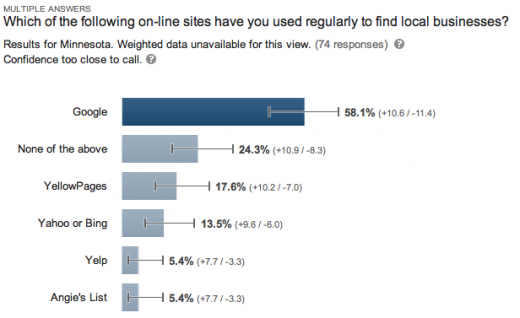
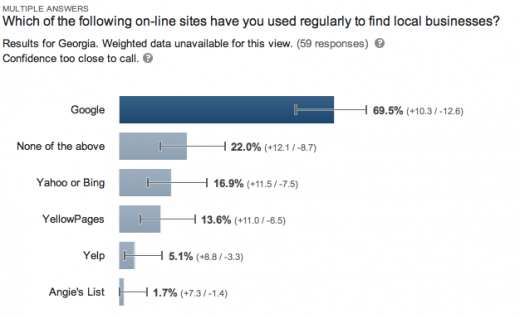
Comments
26 Comments
Mike: I believe it is silly to compare ANY other website with google. It is gigantic. All others are small in comparison. StatCounter, which Moz believes, and I believe , provides far better statistics with more meaningful data than does Comscore suggests Google controls 80% of SE traffic in the US and higher outside of the US. Virtually all webmasters who track their traffic would acknowledge that.
Yelp is so infinitely smaller than google. It is a veritable tiny pimple on the rump of an elephant in comparison. Stop the comarisons. Its ridiculous. Nothing in Search compares to Google. You call your blog Understanding Google Places and Local Search. You don’t call your blog understanding Google, Bing, Yahoo, Yelp and the IYP’s.
On top of that Yelp like virtually every other site is significantly dependent on how Google lays out its results. If Google changes those results to downplay other sites, and continues to highlight google’s own presentations…all other sites lose, including yelp.
The financial results in my mind are additionally a reflection of google’s immense advantage over all other entities. Google’s revenues and profits are a function of its absolute control over search and the “need” for businesses to advertise there.
Google basically doesn’t use sales people. That is unprecedented. If they had to pay a sales force to generate sales their own financials would look somewhat different, and frankly their cash flow and ability to freely invest in other projects would be limited.
The comparisons are unfair to any other entity including yelp. Greg, in his writings, is way off, imho, and you regurgitating it, or echoing it, or writing about it in another way simply dances around a fact: Google is enormous. All other sites pale in comparison….yelp being one of them.
@Dave
Greg, in his writings, is way off, imho, and you regurgitating it, or echoing it, or writing about it in another way simply dances around a fact:
Not sure which article you just read, but I think I made it clear that I don’t agree with the broad stroke of Greg’s point. Yelp is not a Google competitor. They are a distant 2nd and can not compete with google. That being said they do have a niche where they have significant market share. Its a small focused niche and they haven’t figured out how to make money but it is a niche none the less.
If it is defensible on the top side against Google and on the bottom side against the OpenTables of the world, I have no idea.
Yelp users are young and bi-coastal….ok, then I’d LOVE to see the stats on Republican vs. Democrat voters and which they use 🙂
For me, the question isn’t whether Yelp is used as/thought of as a search engine so much, but rather do users click the organic Yelp result in a search over the 7-pack. For many results I’m looking at for my clients, there’s a Yelp result in the organics (usually above the 7-pack).
So Yelp’s share of the spoils of local search, in my mind, are the sum of [people going to Yelp directly and searching] and [people searching on Google/Bing/Yahoo who click on a Yelp page in the organics].
@Michael
I would add to your criteria: And whether those searchers convert for the business at hand.
Good point on conversion–I would imagine the number and quality of reviews would have a huge effect on this.
@Michael
In that Yelp ranks those businesses higher with more reviews, yes for sure.
And that those under 35 trust reviews, yes.
While I can see the value and perception of Yelp as a “player”, it just doesn’t pan out in my market with my clients.
Michael, Mike: We have one of several smb’s wherein the yelp page ranks highly for discovery search let alone name searches. It has a reasonable # of yelp reviews. In its in a category that doesn’t attract swarms of yelpers…but it has gotten enough yelp reviews to rank highly.
Its also an smb in an eastern city(region) and its audience skews younger.
Here is what we see:
It gets a reasonable volume of traffic; 4th after G, B, and Y. But 4th is a tiny percentage of G traffic (B and Y are also small relative to G).
It generates great contact conversions on a percentage basis. Really strong. Fortunately the reviews are good. The smb gives GREAT SERVICE. (the smb also gets great word of mouth and referral business and has for years. (it also has good reviews (dare I say great- on Google plus).
Per yelp it has generated a lot of calls on mobile. We estimate it does likewise off of pc views (per conversations with calls).
It converts. Customers like reviews. Mike has been preaching that for a long time!!!. Its a long term smb/business truism.
We have polled customers. A reasonable number of them said that positive reviews got them to use our service. Of those that referenced reviews a good number said Yelp. Others said Google.
In our region, per Mike’s earlier poll data, Yelp has brand name recognition. Its urban, coastal and skews young. That is yelps market. The area, and certainly the more centrally located restaurants (city and close in suburbs have tons of yelp reviews.) Interestingly they also often have tons of google plus and OpenTable reviews. (In this region the volume of restaurant reviews are now similarly disbursed between these main review players (plus other review sites).
But mainly, in an area, and in a demographic where yelp is strong….it converts at a high rate.
When I look at the yelp traffic geographically and I compare it to how yelp shows in serps across the region….that is extraordinarily telling.
There is SIGNIFICANTLY more yelp traffic to our site when it shows more highly for discovery searches than when it doesn’t. It shows higher or a little lower based on geographic competition on discovery searches.
I can glance at yelp reviews for restaurants where we get a lot of yelp traffic and where we don’t. There are plenty of yelp reviews where we don’t get a lot of yelp traffic. There are yelpers or readers of yelp spaced reasonably similarly across our region.
We get yelp traffic when yelp shows prominently in the serps. That is the ticket. When we get that yelp traffic it converts at great percentages.
In the case of that smb, with good yelp reviews its a Boon.
Yelp has already succeeded in one way: making Google care more about reviews. The City Experts program is a “me too” answer to Elite Squad. To name one example.
But I think for Google it’s just a war of attrition. Don’t “disrupt” the local-reviews space and force Yelp to try something different, or put a ton of resources into it; just hope that Yelp runs out of resources and comes out with the white flag. Your Taliban analogy seems fitting here, Mike.
@phil
Good point. Perhaps I should have ended the article:
While they might not be the Grenada that I implied initially, they are no Spain yet either. It remains to be seen whether the Taliban analogy is appropriate .
Hey folks.
We don’t see a lot of Yelp usage in the UK. We fill out the profiles for local customers and they can be quite visible but usage is just pretty low so getting reviews on their can be tough (you can ask but if none Yelp users sign up and post they tend to be filtered).
I live in the second city in the UK (Birmingham) and searching for a restaurant or such can be pretty pointless as there are no ‘trusted’ reviews and little content.
I noticed slightly better usage in and around (trendy) London and in the entertainment (pub, bar, restaurant) areas but for the most parts it seems a dead duck in the UK for other local businesses.
Not to say that Google Places is a hotbed of great and trusted reviews either though – I figure we are just a little behind you folks in the review stakes (but slowly catching up as ever).
Marcus
@Marcus:
My comments on yelp are based on our experience, albeit limited to the smb’s we operate. Only 1 to date has a sufficient number of reviews to see an impact. Its not a restaurant.
The 1 smb w/ sufficient reviews has seen dramatic serps increases for the yelp page on both recovery searches for our smb and more interestingly discovery searches for the industry…all within our region. It shows on mobile and pcs.
With the higher rankings in google it gets significant traffic. I’m sure the vast majority of that is via search rather than via their app.
Yelp is a known brand here, even as the consumers of this service might not be rabid or active yelpers.
They read the reviews. They contact us at a rate significantly higher than do those from overall google search. Very very high conversion rate.
We polled customers. An important percentage purchased our services based on reviews. Many of those that referenced reviews referenced yelp.
It has helped. The other smb’s have a quiet yelp experience. I can’t comment on them.
@Mike and Phil:
I don’t get this reference to the Taliban. Are you two implying that google is all good and yelp is all bad???
Read my references above to the smb with significant experience with yelp. Do you qualify that as evil???????
Is this article and are these references to suggest that leads from yelp are evil and leads from google are good?
Where do you come up with this????
@Dave
No for me at least I am implying that Google is big and Yelp is little. That Yelp is perhaps a tad more thuggish but both have issues.
Mike:
Google is huge in the local environment. I believe everyone else is small, including yelp, including the other SE’s etc.
check the traffic for all your smb’s. Are there any getting significant traffic from other sources. Total them all up. What sites are competing with google.
thuggish great word. I recently learned there is a book written about a local mafia guy and his family, one of whom I lived around the corner from while I was growing up. Thuggish. An excellent word.
Yelp has the reputation of being confrontationally thuggish to smbs. As you know, we haven’t experienced it from their sales people. We didn’t experience years ago when it was more reported and they were trying to sell us ads. I believe all those claims have died down since yelp went public. In the past 15 months we haven’t experienced it even with I believe 4, 5, or 6 calls from different yelp salespeople.
But I believe the claims from smb operators from California to New Mexico to Minnesota to New York who complained that yelp salespeople were twisting their arms and threatening them. from several years ago. Too many reports from too many disparate types of businesses in too many locations not to believe those comments.
I haven’t heard them more recently.
Google is also thuggish though not as obviously grotesquely so. They have forced our businesses into google plus even though it does nothing for us. They have changed serps, they have penalized us and others for doing things they used to love, they have ignored us while putting us into search purgatory. Google is sneakily thuggish while not acting like thugs.
At worst they totally ignore us while their changing algo’s or penalties or mistakes are killing us. That is also thuggish.
Nobody controls them. They are free to do that without interruption. The only thing that has long term tended to generate instant response is embarrassing them. They do upgrade…but those changes are always a surprise after a lot of behind the scenes work.
If yelp has been, or was, or still might be the old fashioned mafia/thug…google is the slicker newer thug/mafia “whacking you while smiling at you.
I’m for the local businesses…not the web venues…that all present different challenges.
After 15 months with one smb that has experience we see significant and concrete benefits from yelp…but still its small relative to google.
You got it… Tony Soprano vs. Enron
We ask 100% of our users how they found us and about 20% say Yelp. But I believe that is very misleading.
As Michael points out above, Yelp results (at least here in Chicago) often appear at the very top of the organic results. I believe this is why so many of our customers “find” us on Yelp.
Did they really find us on Yelp? Sort of, but they didn’t go to Yelp first – they started on Google.
If Google decided to drop Yelp in its organic results, there’s no question that Yelp traffic would suffer greatly.
So maybe the best possible analogy for Yelp is that of a tick on the back of a Gorilla. It can survive – and maybe even thrive – as long as the Gorilla lets it. But there’s no doubt that the tick is insignificant compared to its host.
Great analogy. One dam annoying tick from the SMBs point if view.
Of the few clients I assist (in Canada), all have Yelp listings but rarely see any traffic at all from them. To be fair their Yelp listings don’t get reviews. I feel like the US is miles ahead in the local search realm. Most businesses (SMBs) that I talk to have no idea about local or even the impact having their listings displaying in the map pack or organic results have on their leads.
For organic listings the majority of the time it is Yellowpages.ca listings that appear above map packs or higher in rankings than any Yelp results.
Unlike Google, Yelp has premium users who pay and can use the features, a normal free account listing cannot. Does that somehow affect the way Yelp ranks businesses? Or the referral traffic coming from Yelp?
Maybe a stupid question to ask, but I feel its the right place to get it cleared.
@Matt McCormick, @Mike:
I hate to be the yelp defender. I speak up on their behalf because we have one smb where a yelp presence has definitely helped.
That doesn’t just come from web stats. We speak with our customers. I’d much rather hear from customers than from marketers. Customers keep the business afloat. Marketers better help us, but first they cost us money. Then hopefully their ideas pan out.
Sometimes they do. Sometimes they don’t.
We have studied the yelp traffic to our site, though and it has added invaluable additional insights. It is why we have found it particularly valuable where we have a strong yelp visibility.
I am SURE it is primarily because of relatively high google rankings. Is some of it coming from people using Yelp apps on their mobiles? (as Yelp would love all to believe).
Maybe…but I KNOW that it is primarily from search, virtually definitely via search in google. We’ve studied it enough to realize that.
I want additional websites showing up in google search and other search to support our businesses.
YUP. They are all dependent on google. Will google rank them highly or not?
Frankly will google rank us highly or not. I’m very concerned about that. Google has made algo changes that not only affect our rankings but last summer they announced changes that affected our rankings plus I’d say 10’s of thousands of local searches with a subtle change. I think it was one more in an endless sea of changes wherein google continues to monetize results for google.
I want to be less dependent on google, not more dependent on google. Google already controls 80% of real search in the US, at least.
Check your web stats.
Yelp, dependent on google search as it is, is a type of site that satisfies customers’ needs. It also has a certain name branding value. It is not huge in every market or demographic as Mike studied and reported in, but where it is popular it helps.
In certain verticals there are other vital review sites. Google plus reviews are of course VITAL.
But yelp is a brand name and google reviews are NOT. In fact as an smb, you have ZERO idea from traffic stats how often people go to your google reviews.
…and frankly Google doesn’t want you to know. Its their page, its their stats. If you believe the stats provided in the local dashboard, I’d like to sell you the Brooklyn Bridge.
Mike, you and I had a particular discussion and you had a follow up about a universal change in dashboard stats some time ago. It really tended to create disbelief in local dashboard stats.
Now we have other smb’s where virtually 90% of our marketing efforts are to make them non google search dependent. It has worked. It has taken a lot of work to get there. We have to keep working on that to get it to continue to work. and we work on search visibility also. but we simply do not want to be Google dependent.
Google is too big, we are too small, and they can make all sorts of changes that can adversely affect us…and they don’t even know who we are or care.
Those are background reasons why sites like yelp are valuable, whether they are found via search, via apps, via direct inputting their urls in the browser or any other way.
Frankly exactly how you want to discover how to make google work for your business….you should do the same thing with other entities, such as yelp, FB, twitter, IYP’s, the media, blogs, print media, word of mouth, bill boards, radio, etc etc etc etc.
Figure it out. Don’t demean them. Especially when they can help.
We have studied and worked to discover one way yelp has helped for one smb. We are currently working to implement the success in one place in two others. Just as we are working to improve google visibility and google attractiveness and working in other ways.
Yelp is not comparable to google. Yelps annual revenues last year were $233 million. Google’s annual revenues were $60 billion. They are not worth comparing in the same breath or suggesting that all of google is good and all of yelp is bad.
@Dave
I agree with everything you just said. In fact, I think any local business that doesn’t make a HUGE attempt to have a great Yelp presence is making an enormous mistake.
I work hard on our business to keep our Yelp listings up to date and encourage all our non-gmail customers to write reviews (I encourage customers with a Gamil address to write a review on Google+).
As a result, we have a fantastic Yelp presence, so when Google shows a Yelp search result in its search results, we come up first on Yelp (so in effect, we come up #1 on Google).
It’s amazing for our business.
That said, I find Yelp irritating for a number of reasons. One is their insanely aggressive sales pitch. I actually had a Yelp salesperson yell at me and tell me I was stupid for not wanting to sign a 1 year deal to show banner ads at ridiculous prices.
Secondly, if Yelp is to be believed, they are responsible for generating about 120% of our revenue this year (yes, they claim to have generated more revenue for us than we actually made). That’s not irritating but it does show how unrealistic they are in their opinion of themselves.
Third, their search algorithm isn’t great. An example…
Our Seattle store has over 200 5-star reviews. Yet, if you search “iPhone Repair” on Yelp (we fix iPhones) the #1 result is “Seattle iPhone Repair” (with 13 reviews) and the #2 result is “iCracked Professional iPhone, iPod and iPad Repair – CLOSED”. For a long time it was “Larry’s iPhone Repair “which had 1 review.
Notice a pattern?
The top results returned are based on the name and not on what the company actually provides. As a result, you find tons of companies gaming the search algorithm (like the iCracked people). This I find incredibly irritating.
Third is they don’t allow companies to choose their own photos. In fact, if you are a competitor of a company, you can upload a bad photo, get a couple of people to recommend that photo, and watch it become the image Yelp uses for the site.
I actually had this happen to me – very annoying. To Yelp’s credit, they did fix it within a couple of days when I reported the image but still, why not let business owner’s select the image to represent their business?
So I was definitely being mean to Yelp in my comment. But it’s frustrating because they are so close to being a great service for small business owners. Instead, they treat small business owners like the enemy and just make our life a little more difficult than it needs to be.
@Matt: We too have been “under siege’ more or less by yelp phone sales people since the traffic picked up about 15 months ago. Either 4, 5, or 6 sales calls. I haven’t gotten that aggressive cr@p from one of their desperate dialing for dollars folks. If i did I’d blast him and them.
On a lot of sales calls we end up laughing. I’ve told them repeatedly I won’t buy ads based on their program. I looked deep and hard at their traffic. I came up with something that well could be productive. The sales people won’t run it up the ranks. I actually put it direct into yelp. Haven’t heard back.
hey I don’t give a hoot about their internal operations and how they communicate or any of those things.
I don’t pay attention to that graphic on sales revenues affected their traffic. All companies do cr@p like that. I honestly don’t look at it. Google gives out information somewhat like that in certain places. Its bs. A business decision maker has to work through the salesy bs. From any business anywhere.
That algo stuff stinks if its by name and nothing else. That is clearly something that is simple. Maybe you could drive links to the yelp page if its so overwhelmingly positive to your business. That might help. I haven’t dealt with, read about or seen anything pertinent to how yelp ranks smbs in a category in a city. But frankly google’s maps algo’s are dramatically simpler than their organic rankings.
I don’t like the photo thing either. They’ve told me they’ll change it if you advertise. I’m not advertising. I have no control over it.
Google has a mechanism of that ilk in a way. Its not that dramatic. An smb has to claim the listing to get control of photos. Mike has gone over that, repeatedly. Still there are endless smb’s that don’t claim their listings in Google.
I sold to smbs and others for years. I am astonished by their approach. It has been based on being “agressive” to say the least. That is putting it mildly 😉
All other sales efforts work at being friendly. People buy from services they like and view somewhat as partners. yelp has not done that at all. That is weird, strange, and cannot work in their favor. That is their problem. Not mine. I don’t understand it. Who is designing their sales effort? Ghengis Khan or Ming the Merciless. Its weird at the very least. I bet its cost them revenues rather than the other way around. Its their problem. Of all the sales calls in the last year, we’ve ended up laughing…even as they are certainly fast, to the point, curt,, but never aggressive to me. I wouldn’t take that sh!t.
I have discovered how it helps us. I’m here to find all the ways sources on the web can help us…not hinder us; all of them; google, the other SE’s, directories, other websites, etc….and yelp.
I’ve got lots more work to do on that issue. The job is unfinished. 😀
@Matt:
The various kinds of searches turn up different interesting results. Man, I’d work on them.
If I search inside yelp for Iphone repair, I see how your smb is buried under the one’s with that in their name. If I search in yelp for I phone repair I see you at the top. (hm search w/out precise spelling).
that is interesting.
If I search in google for either iphone repair or i phone repair I see some different kinds of results.
You have so many attributes to be #1 across the board. But for the life of me…I don’t know squat abt the internal yelp rankings and its dependency on a name.
I just wonder if there are ways to work through that.
From our experience we are getting far more traffic to our business via yelp based on its own serps within google, based on how they show across the region.
that tells me more people are going to the yelp page via its position in google than going to the yelp page directly.
You said yourself yelp depends on google serps. Do you have a feel whether your yelp traffic is via serps or via direct traffic into yelp?
@Dave,
I don’t have great data off the top of my head but I’m pretty confident in saying its a huge percentage of people that find our actual Yelp listing a Yelp search with our company in it directly from a Google search.
As to Yelp’s search algorithm, I eventually had to change our name in Yelp from JCD Repair to “JCD Repair iPhone & iPad Repair”. That took us from about 7-10 in a Yelp search for “iPhone repair” to #1 almost instantly.
I’d prefer not to do these type of gray hat techniques but all of our competitors do so eventually I had to play the same game.
I’d have to say that if you’re a company with lots of good reviews but ranking low on Yelp, you probably need to do the same thing for your Yelp listing – add your top keyword to your name.
Just be careful not to go crazy or Yelp will catch it and revert your name on you and lock it for awhile (I found that out the hard way).
Yelp definitely had a time and a place just like Myspace but I can’t see them being around for much longer. I still recommend to my clients that they have a Yelp business page setup, however I very rarely see them getting much value out of it (like you said though we are in the mid-west so that may have a big effect).
Like @Phil said they did help push Google to focus more on local and I’m thankful for that but other than that I can’t say I’ve ever liked Yelp.
Only time will tell though 🙂
I use Google and Yelp both a lot, but differently. I use Google for a lot of research and even to search for things that I already know the website address for because it’s just simply faster to Google it. I use Yelp when I’m making a purchase or looking for a restaurant and want to confirm my decision. I’ve heard from many business owners that Yelp has dramatically increased their calls, emails and customers. While Google helps provide a great global footprint, Yelp helps provide another line in the water for local business.
Doug
You prove my point to a t. You are apparently located in California which is one of the places that Yelp is doing well.
Mileage, as noted above, varies greatly.
Comments for this post are closed.